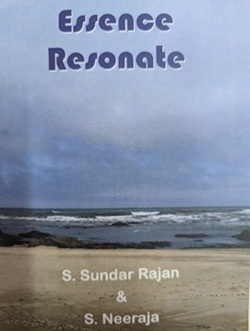Feb 07, 2026
Feb 07, 2026
by Hema Ravi
Review of “Essence Resonate”
(Collection of Poems) by S. Sundar Rajan & S Neeraja
ISBN No:789334334746 Price: INR 150/-
 “Essence Resonate” is a slim volume of poetry with 35 poems by two Gens. These talented individuals aren’t merely connected by their passion for writing, music, and art; they are also gifted with the power of expression and creating poetry that is uplifting, evocative, and awe-inspiring.
“Essence Resonate” is a slim volume of poetry with 35 poems by two Gens. These talented individuals aren’t merely connected by their passion for writing, music, and art; they are also gifted with the power of expression and creating poetry that is uplifting, evocative, and awe-inspiring.
Within the pages, Sundar Rajan’s “tryst with poetic forms” is evident. Familiar structures like the Sonnet, Nonet, Quintet, and Rhyme Royal, alongside less common forms such as the Davidan, Terza Rima, Roundeau, and Macronic are of much significance in this collection. Largely, the thematic explorations delve into nature, religion, his private world, music, and sport. Neeraja's work primarily explores subjects such as tradition, personal reflection, and religion. She also delves into themes of self-awareness, inspiration, and the choices we make – “gentle yet bold,” as Dr. Uma Vangal points out in her brilliant foreword.
Sundar Rajan includes in his emotional preface: “ESSENCE when abbreviated to SNS, represents the first alphabet of my family - Sundar, my wife Nithya, and Swetha (Neeraja), my daughter…” The personal touch further reiterates the familial bond and shared creative endeavor that underpins this book. Again, in the note are these words: “To subtly demarcate our writing, we have introduced a page in the middle, with a painting of Neeraja…” which reminds me of a quote: "Art is not what you see, but what you make others see."
The opening lines set the lyrical flow:
Rhyme and rhythm form the key,
To enjoy good poetry. (p.9 “Time for Poem”)
“Raindrops” personifies the rain as someone who brings “solace.”
Mother Earth, in anguish, conscious,
For sure, she knows we bring solace.
Parched lands, we eagerly embrace (p.12 “Raindrops”)
Rain is not merely a natural phenomenon, but a deliberate, empathetic response from a suffering Mother Earth, offering relief to her dry lands.
“Raindrops Rant,” following this verse, reiterates rain as a conscious, benevolent force that alleviates suffering, brings solace, and revitalizes the natural world, leading to an outburst of joy among living beings.
Am I just turning parched lands into pastures,
Spreading a silent message, so obvious,
Sending flora and fauna in raptures (p.13 “Raindrops Rant”)
A Nonet is a nine-line poem with a specific syllable count per line, descending from nine syllables in the first line down to one syllable in the ninth line.
Rains are welcome,
But cyclones?
I pray,
No (p. 17 “Welcome Rains” (Nonet)
These lines capture the anxiety well – the desire for beneficial rain versus the dread of destructive cyclones. The lines also exemplify the emotional progression, which is very typical of a Nonet.
In “A New Beginning” (Petrarchan Sonnet), the lines evoke a sense of hope and solace found in the celestial display…
A crown of gold envelopes the clouds, grey,
Awaiting the silver Moon, shining shy,
Or is it a flickering flame, so high,
To keep misery and mourning, at bay? (p.18 “A New Beginning”)
Again, these lines are contemplative; the “silver Moon” resonates with the young and the old alike, akin to the rhymes that children sang: “Twinkle, Twinkle…” or “I see the Moon…” They continue to evoke great joy in hearts.
Sundar Rajan’s poem “The New Moon Talk,” inspired by Neeraja’s painting, offers a captivating glimpse into the nature of the moon, personifying it with human emotions and intentions. One has heard of jamming in music, which involves musicians coming together to improvise and create music spontaneously and collaboratively. This jamming of art and poetry, I believe, is appealing and invigorating.
Seeing me so ravishing and shy,
The yearning waves reach out to the sky.
I bid goodbye to traverse my path,
Leaving you waiting, I’ll come unsought (p.28 “The New Moon Talk”)
The moon, affectionately known as “Chandamama” or “Nila” or by any other name across cultures … is a celestial delight, deeply connected to the Earth's rhythms (gravitational pull); even as it constantly charts its course with an assured comeback. “I’ll come unsought,” offers a quiet assurance of continuity and optimism; after all, some factors in life are constant and reliable.
“Lost and Found” is a critique of empty rhetoric and the vanity of those who believe their words are profound “pearls.” It highlights the irony of self-deception; how one's words can be interpreted or perceived by another, becoming something “a fool would be proud of.”
They speak as though their words were made of gold,
With "pearls of wisdom," shining and bold.
If only they could hear their voices out loud,
They'd find that only a fool would be proud. (p. 29 “Lost and Found”)
Here, Sage Tiruvalluvar’s couplet (from the Tirukkural) comes to mind:
Venmai enappaduva thiyathenin oṇmai
Uá¹aiyamyam ennum cerukku . ( Kural 844, from the chapter on Ignorance)
Its rough translation in English is as follows:
“What is called foolishness? It is the pride
Which dares to declare, 'I am wise.” (Translation of the Kural 844)
The poem “The Best Kept Secret” speaks about truth, "open" and "ever free," and about how it is "the best kept secret."? Seemingly contradictory!
It's open, here for all to see.
The Truth behind You - the best kept secret, ever free.
How do you seek the truth, you ask?
Become it - then embrace the proof? (p. 31 “The Best Kept Secret”)
People don’t see what they don’t want to see. Truth, as the young poet suggests, is genuine insight that arises from acceptance, acknowledgement, and welcoming evidence, even when they challenge beliefs and assumptions.
“Arise, Awake and Stop Not till the Goal is Reached!" – the title echoes the famous words of Swami Vivekananda; sets an urgent tone of determination and purpose – individual empowerment while facing innumerable societal challenges.
Born a single girl, yet raised like a son,
She questioned orthodoxy and superstition, one by one.
(p. 34 “Arise, Awake and Stop Not till the Goal is Reached”)
The phrases "raised like a son” and “questioned orthodoxy and superstition” suggest a feminist attitude to life; in fact, they accentuate a character who breaks away from the shackles of conservatism in a society that is both restrictive and regressive. The young writer embodies courage, with a will to dismantle restrictive norms for the benefit of all, particularly those who have been historically disadvantaged by such structures.
The verse “Silence” is a beautiful ode to the profound nature of silence, portraying it as an essential presence. Not just absence of noise, but Silence is a dynamic, generative force, a canvas for creativity, a space for profound truth, and an essential part of existence.
From silence, all things are born,
And into silence, all things return (p.43 “Silence”)
These lines bear a strong resemblance to the Biblical reference "from dust we come, and to dust we shall return."
The thoughts convey a profound philosophical or spiritual truth about the origin, impermanence, and cyclical nature of all things in this world at large. Profound indeed!
In summary, poets appear to be empathetic and discerning individuals who draw inspiration from nature and the complexities of human experiences in an ever-changing, dynamic world.
For the earnest seeker, this slim volume of 64 pages could serve as a valuable guide; for a writer interested in exploring various forms and themes, it would prove to be a ready reckoner.
Get your copy now…
About The poets:
 S. Sundar Rajan is a chartered accountant by profession and a published poet and writer by passion. His collection of short stories has been translated into several Indian languages. His poem 'Full Moon Night' in English has been translated into fifteen foreign languages and thirteen Indian languages. He was in the editorial team of three anthologies.
S. Sundar Rajan is a chartered accountant by profession and a published poet and writer by passion. His collection of short stories has been translated into several Indian languages. His poem 'Full Moon Night' in English has been translated into fifteen foreign languages and thirteen Indian languages. He was in the editorial team of three anthologies.
An avid photographer and Nature and animal lover, he has initiated tree-planting activities in his neighborhood. His motto: Boundless Boundaries Beckon...
 Neeraja Sundar Rajan works in the healthcare industry and spends time on the lab bench. She has always had a passion for various forms of art, including painting, music, and a soft spot for animals. (Baby animals are a bonus!). In her free time, she loves exploring treks and nature trails, it helps her relax and stay active. Deciding to follow in her dad’s footsteps, she started writing poems. She hopes the poems will bring a smile to someone's face and brighten their day.
Neeraja Sundar Rajan works in the healthcare industry and spends time on the lab bench. She has always had a passion for various forms of art, including painting, music, and a soft spot for animals. (Baby animals are a bonus!). In her free time, she loves exploring treks and nature trails, it helps her relax and stay active. Deciding to follow in her dad’s footsteps, she started writing poems. She hopes the poems will bring a smile to someone's face and brighten their day.
19-Jul-2025
More by : Hema Ravi